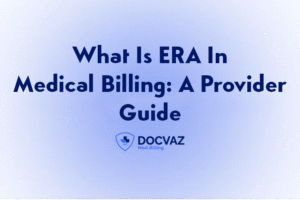Running a healthcare practice in 2025 is like running two businesses at once: taking excellent care of patients, and on the other hand, you are drowning in incriminating bills, claiming, dealing with denials, and endless paperworkHowever, the truth hats, doing these activities at home will lead to wasted time, increased costs, and frustrated staff.
Healthcare Outsourcing is changing the trend now by handing your revenue cycle management RCM tasks to specialized partners. You unlock a smarter, leaner way to run your practices. Are you thinking of payoff? Lower administration overhead, fewer billing errors, faster repayments, and more cash flows. Get precision and affordable medical billing services costs in the USA.
What is Healthcare Outsourcing?
Healthcare outsourcing is the practice of contracting third-party vendors to manage specific healthcare-related tasks. These can include:
- Medical billing and coding
- Transcription services
- IT support and EHR management
- Claims processing
- Revenue cycle management (RCM)
- Call center or patient scheduling
- Utilization review and prior authorization
By outsourcing these non-clinical or administrative functions, hospitals and clinics can reduce overhead and allocate resources more effectively.
Ways to healthcare Outsourcing cuts and costs
Here are some specific ways described properly below:
Access to advanced technology without big bills
Healthcare technology is evolving very fast, but maintaining it is essential and expensive for personal activities. Outsourcing partners invest heavily in AI tools, telemedicine platforms, and cloud systems, then share that price range with all the clients. In this way, even the small clinics can easily afford advanced technologies and effective outcomes, without breaking down their budgets.
Say Goodbye to Maintenance Costs
Doing everything at home is the same as running the office setup, IT systems, cost management, and hardware. These activities can easily drain the budget quickly. Through having outsourcing facilities, providers have to subtract buying and maintaining infrastructure. Most vendors supply and manage the tools as per their requirements. This might be beneficial for them to save significantly and redirect the funds towards patient care marketing or the expansion of facilities.
Reasonable, HIPAA Grade Data Security
The most important challenge a healthcare provider faces is securing the data. Creating a strong system that meets the requirements of the PAA standard needs serious investments, IT systems, and trained, skilled team members. Outsourcing service providing teams, however, specialize in security and offer you enterprise-grade protection – encryption that easily provides access controls, removes recovery at a fraction of affordable costs. Providers get peace of mind by knowing that their patients’ records are safe without heavy overhead.
Reduces Labour Costs With Global Talents
Hiring and retaining the skilled, trained staff in the US comes with higher price ranges, advantages, and training expenses. Outsourcing healthcare providers access to a pool of experienced and qualified global talents at more affordable cost levels. An expert in medical, billing, and coding, a transcript provides you with precise and effective work, while, on the other hand, outsourcing healthcare firms handle HR and operational departments. The providers get you the top-notch quality that helps at a fraction of the local price.
Hassle-free Revenue Cycle Management
Revenue Cycle Management is complicated to handle, and even a minimal error can lead towards the denials claims or delayed payments. Outsourcing RCM specialists confirms that every is filed completely and repayments come rapidly, and cash flows stay steady. This takes off the financial pressure of the providers. It permits them to provide patients with proper care without worrying about the administrative bottleneck.
Cut Real Estate Expenditures
When the providers try to handle each and every problem at home, they might require additional space for staff, equipment, and paperwork. This drives you to rent, renovation, and the costs of expansion. Outsourcing easily solves this issue by shifting non-clinical tasks, billing and coding, also the transcriptions off-site . They practice most of their existing space while saving thousands every year on real estate and services updates.
Scalable Services that Fulfill Your Requirements
Healthcare never stays the same, with new technologies, regulations, and patients’ requirements that maintain the industry movements. Outsourcing partners may understand this and deliver you the flexible, scalable Services that develop with your practices. No matter whether you need coding, billing, and compliance, outsourcing firms adapt rapidly and provide you with the most affordable solution that adjusts to ur evolving needs.
More Time for PatientCare
At the end of the day, the major objective of healthcare providers is to provide more patient care. Administrative goals also often steal valuable time and energy ley outsourcing these tasks, providers free up resources and concentrate on the best they can do while supporting the individuals. With experts handling back office processes efficiently, the practices can easily enhance the care quality while keeping the operational costs down.
Cut Costs, Not Quality — Choose Docvaz.
Are you ready to alter the way your healthcare practice running system? Book DocVaz right now, and take yourself out of this stress of billing, compliance, and back office operations. With our trusted solution of outsourcing healthcare services in the USA, you can save time, costs and concentrate on what affects you the most. Get partners with us and experience seamless aid that drives growth and efficiency.
FAQ’s
How is it worth it to decrease the costs?
It cuts overhead by removing the requirements for in-house staff and the devices or equipment used.
What tasks do outsourcers provide to reduce the cost levels?
Billing, coding, transcriptions, and administrative work are the most common tasks that decrease your cost figures.
Does outsourcing reduce the training expenditures?
Yes, it will help if your team is skilled and properly trained in outsourcing.
Can outsourcing improve the revenue cycle efficiency?
Experts handle claims quickly and decrease the denials and delayed payments.
Is outsourcing more affordable than setting up or hiring an outsourcer at home?
It may offer you affordable costs at a general fraction level.
Does it help manage the fluctuations in workload?
Yes, it offers you scalable staffing without any additional charges or hirings.




